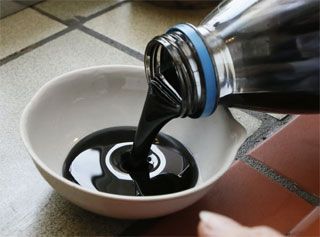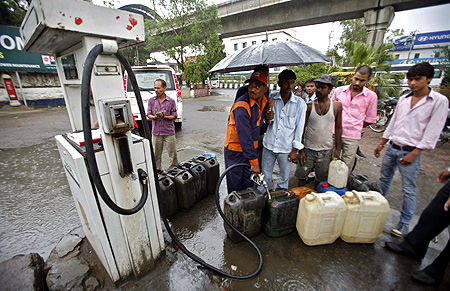
Falling oil prices globally have benefitted India a lot. The government needs to plan and complete subsidies reforms if prices rise again, notes A K Bhattacharya, Editor, Business Standard
International crude oil prices have declined by over 70 per cent in the last one year and a half. With about 80 per cent of its crude oil requirements being met through imports, India has benefitted hugely in a variety of ways.
Should the government celebrate or pause and plan for measures that need to be taken now in the event crude oil prices start rising again?
But, first take a look at the broad areas of benefits.
In 2014-15, it imported an estimated 189 million tonnes of crude oil and spent about Rs 6.9 lakh crore (R 6.9 trillion).
In the current year, India’s crude oil imports, estimated at a little lower at 188 million tonnes, may cost it about Rs 4.5 lakh crore (Rs 4.5 trillion).
This is a huge gain.
If nothing else, Prime Minister Narendra Modi’s promise of ushering in achhe din or good days seems to have been fulfilled in the oil sector, though largely because of international developments.
Consider the following: One estimate puts the gains for customers of petroleum products as a result of several rounds of retail price cuts at Rs 60,000 crore (Rs 600 billion) in the first seven months of the current financial year.
International crude oil prices continue to fall and a few more rounds of retail price cuts in the remaining months of the current year are not ruled out.
This could well mean a gain of around Rs 1 lakh crore (Rs 1 trillion) for individual and industrial users of petroleum products.
The government, too, has been judicious and has not deprived itself of the dividends of achhe din.
It has already raised the excise duty on petroleum products to garner an estimated Rs 93,000 crore (Rs 930 billion) on an annualised basis.
The year is not yet over and a few more duty increases are not ruled out.
So the net annualised revenue mop-up on account of oil will be well over Rs 1 lakh crore (Rs 1 trillion).
Oil refining companies have also gained significantly.
None of them wails any more about under-recoveries -- the deficit between the selling price of petroleum products and the cost of refining crude oil and marketing the products.
Indeed, one of the state-controlled oil refiners have begun building a surplus reserve on account of the lower rate of fall in retail product prices and a higher rate of decline in the crude oil prices.
The impact of falling oil prices on the government’s finances has been positive in another way.
The government’s total subsidies bill was estimated at Rs 2.66 lakh crore (Rs 2.66 trillion) in 2014-15.
Over a fifth of this bill was due to subsidies for the oil sector, as the government would not pass on the full impact of the crude oil prices to the retail prices of petroleum products.
In the current year, the subsidies bill for the oil sector has shrunk to only Rs 30,000 crore (Rs 300 billion) and its share in the government’s total subsidies expenditure is only 12 per cent.
Next year the benefits would be even bigger, as oil subsidies should be eliminated.
An 11 per cent drop in India’s trade deficit in the first nine months of the current financial year is also due largely to the falling oil prices, although this is not an unalloyed benefit.
Imports may have fallen 16 per cent in the first nine months of 2015-16, but the worry is that exports too have taken a big hit -- a drop of 18 per cent in the same period, since petroleum products are now the biggest item in India’s exports basket.
Imagine, therefore, a situation when international crude oil prices start rising again. What would happen to India’s trade deficit?
It would start ballooning again, causing the current account deficit, too, to widen.
How sustainable will be the government’s expenditure on subsidies?
Would it not become difficult for the government to maintain its increased excise duty on petroleum products at the existing rates?
If it is cut, the government’s revenues would be hit.
And if it is not, petroleum product prices would shoot, stoking the fire of inflation.
The questions, therefore, are: Has the government begun planning for the day when oil prices could rise again?
And has it got a plan to complete all its subsidies reforms in sectors that are impacted by oil prices?
It is time the government began this exercise.










